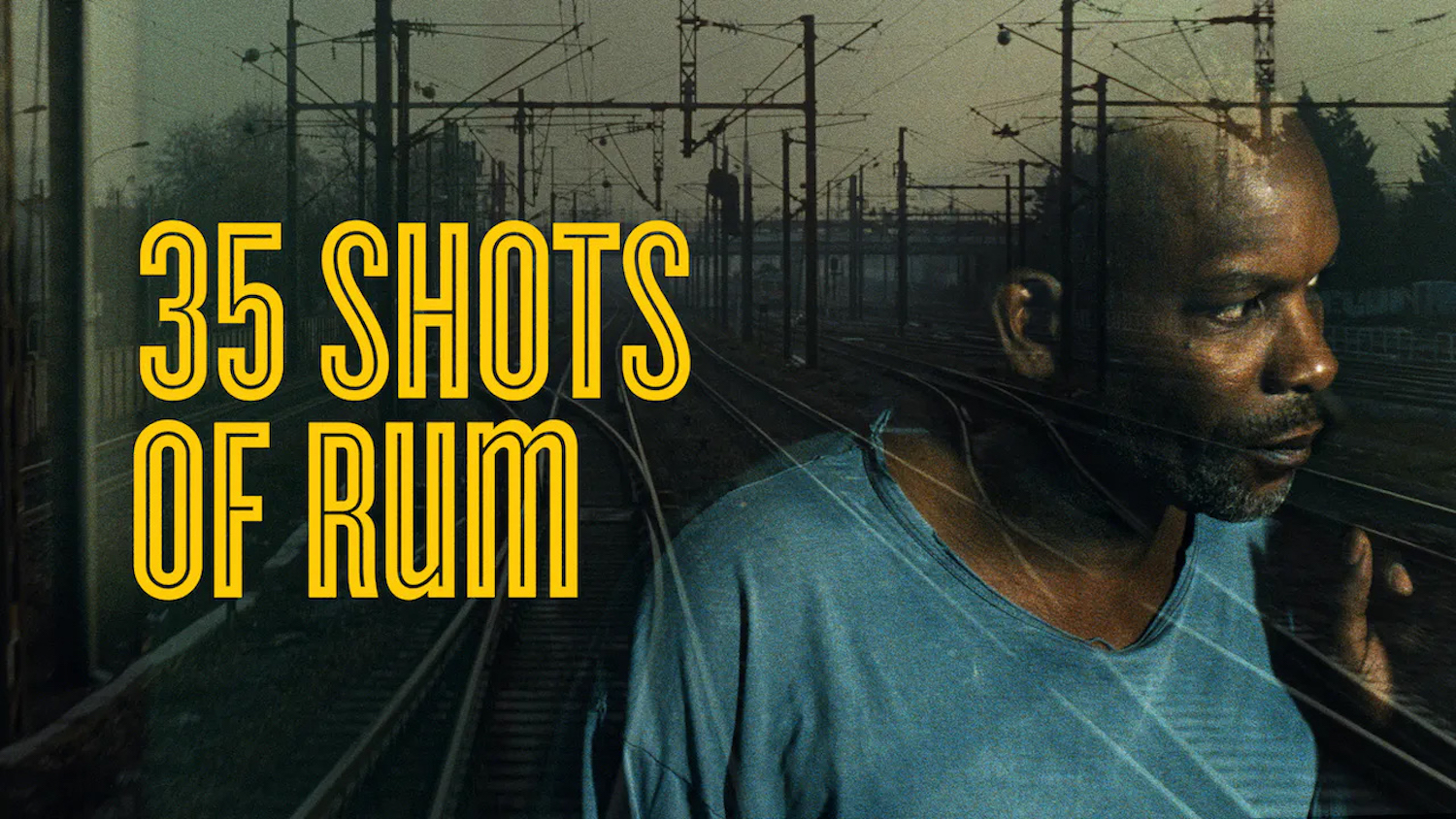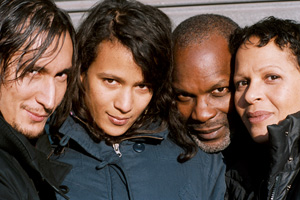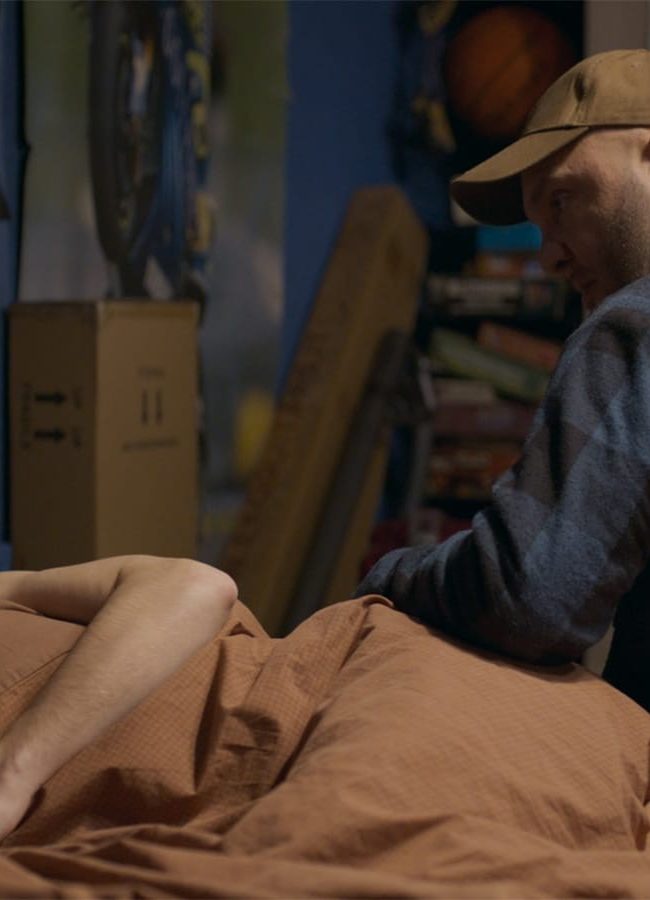
(35 Shots of Rum is being distributed by The Cinema Guild. It screened theatrically at the Film Forum Wednesday September 16th through Tuesday September 29th, 2009, and is now available on DVD. Visit the film’s official website to learn more.)
Few modern directors have delivered as many cinematic riches as Claire Denis, but with 35 Shots of Rum, Denis has blessed us with her most generous offering yet. Her genre of choice for this outing—the family drama—has been pummeled into negative submission over time. When it comes to mothers, fathers, and children, movies love to tell tales of bitterness, hate, and dysfunction. But leave it to Denis, one of our finest living practitioners of the craft, to bring a surging gust of warmth to the kitchen table. A love letter to Denis’ mother’s relationship with her own father, 35 Shots of Rum is a functional family drama of the very highest order. It proves that a story about positivity, accord, and love between bloodlines can make for an experience that is as riveting as—not to mention far more soulfully gratifying than—the typical pessimistic fare.
As a storyteller, Denis has never been one to follow the rules. Here, she breaks from tradition once again, in her typically elusive, quiet way. We open on train tracks on the outskirts of Paris, as Agnes Godard’s luscious cinematography views the passing landscape from inside the moving train—from, it should be noted, the conductor’s point-of-view. One of those conductors is Lionel (frequent Denis collaborator Alex Descas), though when we meet him, he is not working. He is standing near the tracks, smoking a cigarette. Denis apparently wanted to make this film for years but was forced to wait until Descas had reached an appropriate age before she could tell her story. She didn’t want to make it without him. In that opening shot of Lionel staring out into the Parisian expanse, Descas’ statuesque face speaks volumes. It says everything, even though we don’t know what that everything is just yet.
A pretty young woman, Josephine (Mati Diop) is on one of those trains. On her way home that night, she buys a rice cooker. While cooking dinner, someone enters the apartment. It’s Lionel. He walks into the kitchen and presents Josephine with something he has bought for her: a rice cooker. In this tiny gesture, the depth of love between this father and child is fully, richly conveyed. This man isn’t like every other man. This father isn’t like every other father. And this relationship isn’t like every other relationship (certainly not ones we’re used to seeing on screen). As Lionel and Josephine sit down to eat dinner together, the comfort with which they interact establishes their history better than any dialogue ever could. 35 Shots of Rum is about the relationship between a doting father and his hopelessly devoted daughter, at the moment when they begin to realize that the time has come to let go of one another and go their separate ways.
 This isn’t to say that 35 Shots is all hugs and kisses, for this is also a film about longing and the sadness that brings. Lionel longs for his wife, who died when Josephine was a baby; a fling with his neighbor, the cab driver Gabrielle (Nicole Dogue), has resulted in her quietly pining for Lionel; and Noe (Gregoire Collin), who lives alone with his cat in his deceased parents’ apartment, is infatuated with Josephine but can’t find the courage to act upon it. This all comes to a head at the film’s midway point, when Denis unleashes a breathtaking, unforgettable sequence set to the Commodores’ “Nightshift.” As the music begins, we watch the long gestating union between Noe and Josephine form on an impromptu dance floor in a small restaurant. Just as quickly, it breaks apart. Moments later, Lionel forms his own new union, but not with Gabrielle. It’s with the gorgeous restaurant owner, whom he has just met. Denis miraculously lets us know this is going to happen from their very first glance. Gabrielle, proud but defeated, must accept her fate.
This isn’t to say that 35 Shots is all hugs and kisses, for this is also a film about longing and the sadness that brings. Lionel longs for his wife, who died when Josephine was a baby; a fling with his neighbor, the cab driver Gabrielle (Nicole Dogue), has resulted in her quietly pining for Lionel; and Noe (Gregoire Collin), who lives alone with his cat in his deceased parents’ apartment, is infatuated with Josephine but can’t find the courage to act upon it. This all comes to a head at the film’s midway point, when Denis unleashes a breathtaking, unforgettable sequence set to the Commodores’ “Nightshift.” As the music begins, we watch the long gestating union between Noe and Josephine form on an impromptu dance floor in a small restaurant. Just as quickly, it breaks apart. Moments later, Lionel forms his own new union, but not with Gabrielle. It’s with the gorgeous restaurant owner, whom he has just met. Denis miraculously lets us know this is going to happen from their very first glance. Gabrielle, proud but defeated, must accept her fate.
The first time I saw 35 Shots of Rum, I was awed by the film’s overriding humanity and transcendence of race, especially with the knowledge that it was made by a white filmmaker. Yes, these Parisians were black—just about every character in the film was black, in fact—but this wasn’t a political, primary choice. It wasn’t even a secondary one. It had nothing to do with that. It was about the love between a parent and child, and their poignant quest to break free from one another without hurting each other’s feelings. The second time I saw it, that changed and the film became loaded with racial implications, which had me wanting to write exclusively about that. Having recently revisited it for a third time, my reaction was colorblind once again. This doesn’t speak of my wishy-washiness as a viewer. It speaks of the profound depth of Ms. Denis’ achievement.
Many distrustful viewers, who have been tainted by a lifetime of cinematic dysfunction, might question the closeness of Lionel and Josephine’s relationship. As filmed by Denis and Godard, the kisses and touches hint of something deeper. But by the time we witness the film’s seemingly insignificant, but devastatingly sweet, final shot, that something deeper confirms what we’ve hoped for all along. For once, mercifully, a filmmaker has chosen to tell a story about the magical bond of true familial love, and she has executed it with subtlety and grace. 35 Shots of Rum is one of the loveliest films of the decade.
— Michael Tully











